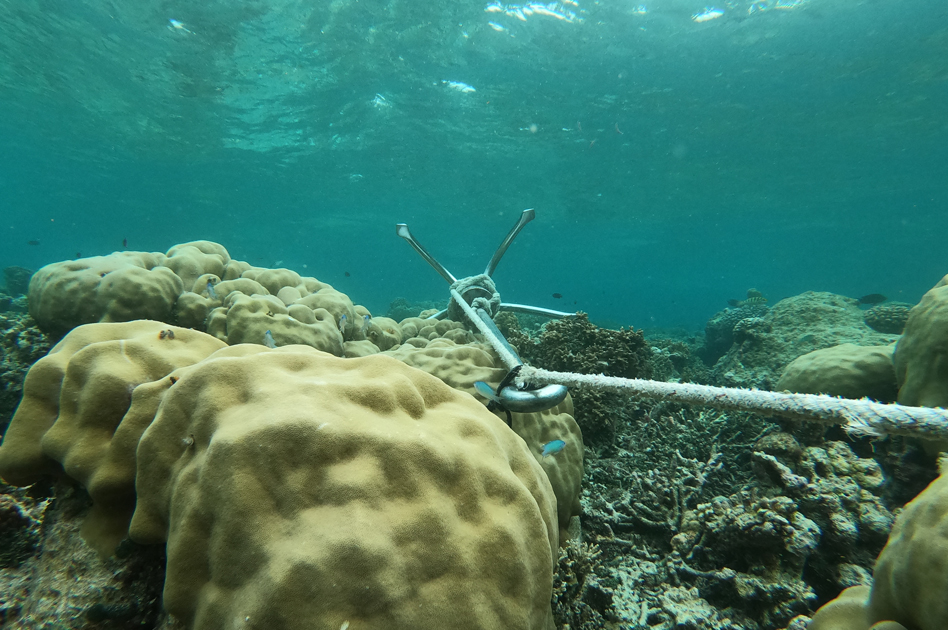Mooring project to minimize anchoring damages to bait fishing grounds (Reefs)
Dhivehi Masverin (Maldives Fishermen)
(
Non-governmental organization (NGO)
)
#OceanAction46956
Description
The project aims to protect from damage caused by throwing anchors to bait fishing grounds (reefs) of Huvadhoo Atoll. Since the start of the project, NGO did one baseline assessment of six reefs and installed traditional mooring by tying ropes to selected corals. Two reefs were left as controlled sites to compare the effect of throwing anchors and protected sites. From the first baseline assessment, the data showed drag marks and damages of corals in all the sites. Branching coral was very less. However, four sites were rich in marine bio diversity. With this project Dhivehi Masverin NGO is trying to gather data for authorities for future decision making process. At the same time create awareness among fishermen about the importance of keeping our marine environment safe for the future and sustainability of bait fishery. Within the last one and a half year we have taken two data sets on the reefs. Still we need more time to maintain and gather data to see the changes in the research reefs. So far we have managed to maintain four reefs with mooring systems and we see positive response from fishermen using the mooring system.
Dhivehi Masverin (Maldives Fishermen) Gemanafushi Island Council Ministry of Fisheries Marine Resources and Agriculture Ministry of Environment Environmental Protection Agency
SDGS & Targets
Goal 14
Conserve and sustainably use the oceans, seas and marine resources for sustainable development
14.1
By 2025, prevent and significantly reduce marine pollution of all kinds, in particular from land-based activities, including marine debris and nutrient pollution
14.1.1
(a) Index of coastal eutrophication; and (b) plastic debris density
14.2
By 2020, sustainably manage and protect marine and coastal ecosystems to avoid significant adverse impacts, including by strengthening their resilience, and take action for their restoration in order to achieve healthy and productive oceans
14.2.1
Number of countries using ecosystem-based approaches to managing marine areas
14.3
Minimize and address the impacts of ocean acidification, including through enhanced scientific cooperation at all levels
14.3.1
14.4
By 2020, effectively regulate harvesting and end overfishing, illegal, unreported and unregulated fishing and destructive fishing practices and implement science-based management plans, in order to restore fish stocks in the shortest time feasible, at least to levels that can produce maximum sustainable yield as determined by their biological characteristics
14.4.1
14.5
By 2020, conserve at least 10 per cent of coastal and marine areas, consistent with national and international law and based on the best available scientific information
14.5.1
14.6
By 2020, prohibit certain forms of fisheries subsidies which contribute to overcapacity and overfishing, eliminate subsidies that contribute to illegal, unreported and unregulated fishing and refrain from introducing new such subsidies, recognizing that appropriate and effective special and differential treatment for developing and least developed countries should be an integral part of the World Trade Organization fisheries subsidies negotiation
14.6.1
Degree of implementation of international instruments aiming to combat illegal, unreported and unregulated fishing
14.7
By 2030, increase the economic benefits to Small Island developing States and least developed countries from the sustainable use of marine resources, including through sustainable management of fisheries, aquaculture and tourism
14.7.1
Sustainable fisheries as a proportion of GDP in small island developing States, least developed countries and all countries
14.a
Increase scientific knowledge, develop research capacity and transfer marine technology, taking into account the Intergovernmental Oceanographic Commission Criteria and Guidelines on the Transfer of Marine Technology, in order to improve ocean health and to enhance the contribution of marine biodiversity to the development of developing countries, in particular small island developing States and least developed countries
14.a.1
14.b
Provide access for small-scale artisanal fishers to marine resources and markets
14.b.1
Degree of application of a legal/regulatory/policy/institutional framework which recognizes and protects access rights for small‐scale fisheries
14.c
Enhance the conservation and sustainable use of oceans and their resources by implementing international law as reflected in United Nations Convention on the Law of the Sea, which provides the legal framework for the conservation and sustainable use of oceans and their resources, as recalled in paragraph 158 of "The future we want"
14.c.1
Number of countries making progress in ratifying, accepting and implementing through legal, policy and institutional frameworks, ocean-related instruments that implement international law, as reflected in the United Nations Convention on the Law of the Sea, for the conservation and sustainable use of the oceans and their resources
SDG 14 targets covered
| Name | Description |
|---|---|
| 14.2 | By 2020, sustainably manage and protect marine and coastal ecosystems to avoid significant adverse impacts, including by strengthening their resilience, and take action for their restoration in order to achieve healthy and productive oceans |
| 14.5 | By 2020, conserve at least 10 per cent of coastal and marine areas, consistent with national and international law and based on the best available scientific information |
Deliverables & Timeline
Maintain the reefs with moorings (We can maintain reefs for another 18 months by renewing the mooring ropes and repairing broken ones)
Continuing data collection and research (the existing project lacks funds for extensive research on the reefs)
Resources mobilized
Partnership Progress

Feedback
Action Network

Timeline
Entity
SDGs
Other beneficiaries
Local Fishermen Youths
Ocean Basins
Communities of Ocean Action
Website/More information
Countries

Headquarters
Contact Information
Ahmed , President

